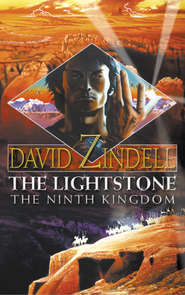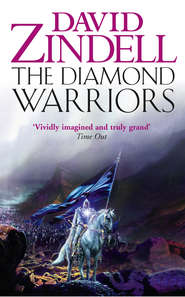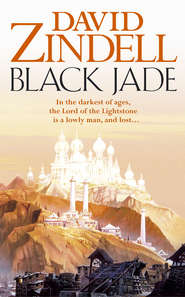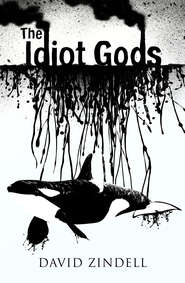По всем вопросам обращайтесь на: info@litportal.ru
(©) 2003-2024.
✖
Lord of Lies
Автор
Год написания книги
2019
Настройки чтения
Размер шрифта
Высота строк
Поля
‘Lord of Light!’ someone below me cried out. ‘Lord of Light!’
Sounds of disappointment and protest now rumbled through the hall. It came to me then that the more I denied that I was the Maitreya, the more that others might interpret this as humility and so be even more inclined to acclaim me as the Shining One.
‘Lord of Light! Lord of Light! Lord of Light!’
I was keenly aware, however, that while I hadn’t claimed to be the Maitreya, I hadn’t denied it, either. It tormented me to remember that Morjin had struck a similar pose before his evil priests in Argattha.
After that, my father announced that the feast had come to an end. The various knights, ladies and lords began standing up from their tables and exited the hall to repair to their chambers. The thirty Guardians remained at their post, the steel rings of their mail reflecting the Lightstone’s abiding radiance. Their bright, black eyes remained ever watchful, ever awake, ever aware – and now aware of me in a way that they hadn’t been before.
So it was with Lansar Raasharu, who was one of last to say goodnight. He seemed not to want to leave my side. The wonder with which he now regarded me filled me with a gnawing disquiet.
I returned to my family’s table, where I retrieved the box that Salmelu had set before me. I resolved to bury its contents deep within the earth. Morjin’s letter I picked up with fevered hands and tucked down inside my armor. I didn’t know how I would find the courage to open it.
I stood for a long time staring up at the Lightstone as the words of Kasandra’s prophecy burned themselves deeper and deeper into my mind: that I would find the Maitreya in the darkest of places; that the blood of an innocent would stain my hands; that a ghul would undo my dreams; that a man with no face would show me my own.
4 (#ulink_f8e4091d-1528-5772-8f0b-b8e8b5fad276)
My father, before he left the hall, informed me that there was to be a gathering in his rooms. While he walked on ahead with Asaru, Nona and my mother, I proceeded more slowly with Master Juwain and Maram, who had also been invited to this unusual midnight meeting. Maram was in his cups, and in no condition to hurry. I offered my arm around his back to steady him, but he shook me off, saying, ‘Thank you my friend, but I’m not that drunk – not yet. Of course, your father has promised me some of his best brandy. Otherwise, I would have been tempted to find Dasha and recite a few lines that I composed during the feast.’
‘Dasha?’ I said, shaking my head. ‘You mean Behira, don’t you?’
‘Ah, Behira – yes, yes, Behira.’
We made our way down the short corridor connecting the hall to the castle’s keep. There we found another corridor leading straight to my father’s rooms. Most of his guests had already retired for the night, but from the deeps of this great building came sounds of low voices and heavy oak doors creaking and closing. We passed by the infirmary, which was quiet enough, though a stench of medicines and bitter herbs emanated from it, as well as a more ancient odor of anguish of all the sick and dying who had ever lain inside. To me, carrying Salmelu’s wooden box, brooding upon Kasandra’s warning, it seemed to be the very essence of the castle itself, and it overlay other odors of burnt flesh from the kitchens and the centuries of candle smoke that darkened the stone ceiling and walls. I was glad to pass by the empty library and the servants’ quarters and so to come to the great door to my parents’ rooms. For inside, there had always been happier scents: of soap and wax from the well-scrubbed floors; of flowers that my mother arranged in vases and the honey-cakes that she liked to serve with tea and cream; and most of all, the air of safety and steadfastness with which my father ordered all things within his realm.
Asaru opened the door for us and invited us inside. There we removed our boots and joined my father, mother and grandmother, who were sitting around the edge of a fine Galdan carpet. My father disdained chairs, claiming that they weakened one’s back and encouraged poor posture; to suit convention, he filled his hall with many tables and chairs but would allow none in his rooms. I looked around this large chamber as I drank in its familiar contents: the two fireplaces filled with fresh white logs and the six braziers heaped with the coals of fragrant woods that helped drive away the castle’s omnipresent chill; a cherrywood chest that had once belonged to my grandfather and a painting of him, hung on the west wall, that my grandmother had once made; another carpet on which rested a chess board with its gleaming ivory and ebony pieces; a loom where my mother wove colored threads into tapestries. And at the room’s north end, framed by a massive, carved headboard, stood my parents’ bed where twenty-one years before I had come into the world on a warm winter day, with the sun at the midheaven in that bright and fiery constellation of stars that called me ever on toward my fate.
I sat straight across from my father, who poured me a glass of brandy. Maram and Master Juwain sat to my right, while Asaru took his place next to my mother and grandmother on my left. Asaru, it was said, favored my mother, his face cut with the same clean and symmetrical lines in which many found a great beauty. His faithfulness to her, and to all those he honored, could make one cry. He was that rarest of beings: a very intelligent man who saw things simply without ever being simple-minded. His love for me was simple, too – and as strong and bright as a diamond.
‘That was a close thing that happened tonight,’ he said to me as my father passed him a glass of brandy. ‘That traitor nearly got you killed.’
Everyone turned toward my father, who held his face stern. No one seemed to have the courage to ask him if he really would have ordered my death, should I have murdered Salmelu.
‘We’ll speak of the emissary in a moment,’ my father said. ‘But we’ve other things to discuss first.’
‘But what of Karshur and Yarashan?’ I asked. ‘And Jonathay, Ravar and Mandru? Shouldn’t we wait for them?’
‘No, let them sleep. It will be best if we keep this council small.’
‘Ah, sleep,’ Maram said as he yawned, then took a sip of his brandy. ‘Don’t you think we’d all do better, King Shamesh, with a little sleep before discussing anything of importance?’
‘Certainly, we would do better, Sar Maram,’ my father said. ‘But the world won’t always wait while we retreat into sleep, will it?’
I shifted on top of the carpet, with its thick and clean-smelling wool. Sitting on it in my steel armor was almost a comfort. I looked at my father and said, ‘What is troubling you, sir?’
He looked straight back at me, and his eyes fell dark with a terrible sadness. I knew that had he been forced to order my death, he might as well have ordered his own.
‘Many … things are on my mind,’ he said to me. ‘Which is why my family has been called to council at such a late hour – and those who are like unto family.’
He smiled at Master Juwain and Maram, then continued: ‘We’ll begin with the demands of the Alonian emissary. Asaru, what do you think?’
Asaru, sitting straight as the mast of a ship, nodded at my father and said, ‘Like it or not, King Kiritan has finessed us. It seems that the conclave will have to be held in Tria, if anywhere.’
‘Yes, it does.’
‘But the Valari kings will never agree to journey there.’
‘No, not as things stand now,’ my father said.
‘And there would be great trouble in the Nine Kingdoms if the Lightstone were brought into Tria, as King Kiritan has asked.’
‘That is true,’ my father said. ‘Especially if the Lightstone were given into the hands of the blacksmith boy. The Ishkans would make war against us immediately for such a betrayal.’
I again shifted about as I thought of the young Alonian healer named Joakim. And I heard Asaru say to my father, ‘Count Dario hinted that King Kiritan’s barons are calling for war against us – does this concern you?’
‘Do you think it should?’
‘That’s hard to say. It seems impossible that the Alonians would march against us across such a distance. Not over a little piece of gold.’
Although the Lightstone remained on its stand in the great hall, it seemed that its shimmering presence filled the room and added to the soft radiance of its many flickering candles.
‘No, you’re right, we need fear no such invasion,’ my father said. ‘But that Count Dario spoke freely of King Kiritan’s problems with his barons – that does concern me.’
He went on to say that such strife could weaken any kingdom, even Alonia. And with Morjin gathering armies to his bloody red banner, it would not do for any of the Free Kingdoms to fall into disorder – especially Alonia.
‘It would seem,’ my father said to Asaru, ‘that strengthening his realm is the real reason that King Kiritan has demanded your “little piece of gold”. It is probably why he called the Quest in the first place.’
‘To strengthen Alonia or to strengthen himself?’
‘He would think there is no difference,’ my father said.
My mother, sitting next to him, brushed the long, black hair away from her face as she said, ‘King Kiritan’s offer of his daughter’s hand must be considered in this light. And like it or not, it must be considered.’
Her voice was as clear and sweet as the music of a flute, and it seemed to carry out straight toward me. As she smiled at me, I couldn’t help remembering how she had taught me to play that most magical of instruments and had sung me songs of Ramsun and Asha, and the other great lovers who had died for each other in ages past.
‘It’s said that Atara Ars Narmada is very beautiful,’ my mother told me. ‘With hair as gold as your cup. With eyes as blue as stars.’
‘Once they were,’ I said bitterly, squeezing the box that I had set by my side. In barely three heartbeats’ worth of time, Morjin had utterly transformed Atara’s face from one that was open, bright and alive into something other. For now shadows gathered in the dark hollows beneath her brows, and her lips would have frozen the breath of any man who dared try to kiss her.
It might have been thought that my mother, who was the kindest of women, would have done anything to avoid a topic that caused me so much pain. Compassion, I thought, should be like a soft, warm blanket wrapped around those we love to comfort them, and hers usually was. But sometimes, it was like a steel needle that plunges straight into the heart of a boil to relieve the pressure there. My mother seemed always to know what I needed most.
‘You should remember her as she was when you first saw her,’ my mother told me. ‘Don’t you think that is what she would want?’
‘Yes … she would,’ I forced out. And then I added, ‘And as she might be again.’
My mother’s face softened as she searched for something in mine. ‘You’ve never said much about her, you know.’
‘What is there to say, then?’











